Exploring Dubai's Luxury Real Estate Market
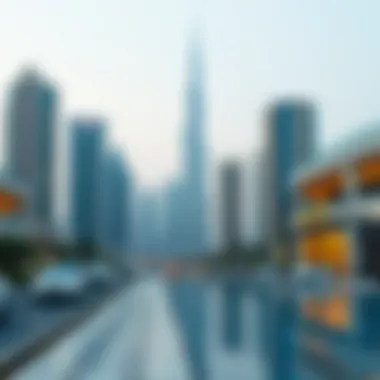
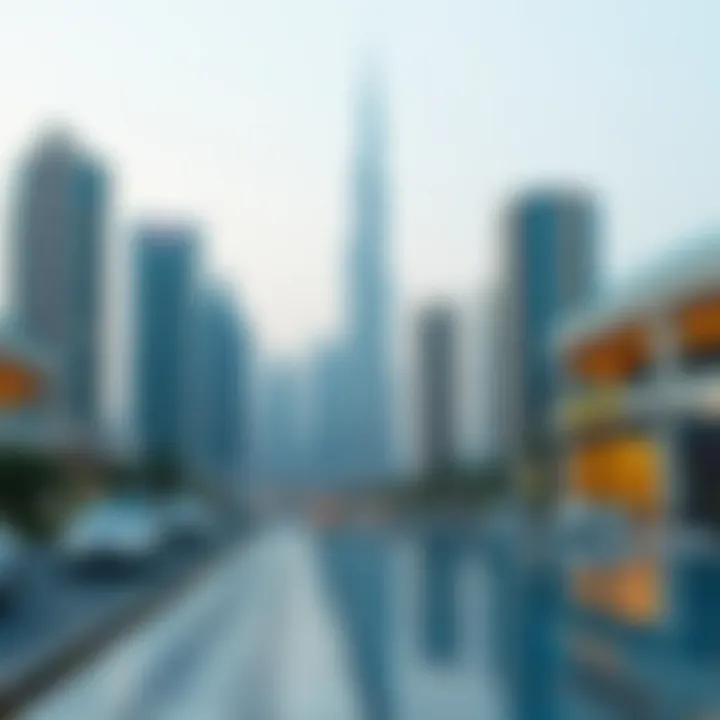
Intro
Dubai's luxury real estate market stands as a shimmering beacon for those seeking both grand living spaces and solid investment opportunities. The city is a melting pot of cultures and ambitions, where the opulence of high-rise buildings meets the timeless charm of traditional Arab architecture. With the constant influx of expatriates and wealthy globetrotters, the demand for luxury homes has soared to unprecedented levels.
Understanding the intricacies of this market requires a deep dive into its neighborhoods, property offerings, and the nuances of buying in such a vibrant locale. This guide aims not only to inform but also to empower potential buyers and investors, helping them to navigate the complexities of acquiring real estate in Dubai.
Property Listings Overview
Current Market Trends
The landscape of Dubai's luxury real estate fluctuates with the whims of both local and global trends. Currently, the market shows a push towards sustainability, with many developers focusing on eco-friendly projects that combine luxury with environmental consciousness.
Investors are leaning towards mixed-use developments that offer not just residences but also lifestyle amenities. High demand is seen in areas like Dubai Marina and Downtown Dubai where properties with stunning views and premium facilities are attracting a premium price.
Prices can fluctuate, but current estimates indicate an increase in transaction volumes, signaling a healthy market. For instance, properties in Palm Jumeirah have been reported to maintain a steady appreciation rate, which is encouraging for long-term investors.
"Investing in Dubai’s luxury real estate is not just about owning a piece of property; it’s about being part of a global network of affluent individuals."
Featured Properties
Among the crown jewels of the real estate market, several properties stand out:
- Gems Estates: Located in the Al Barari area, these bespoke residences offer sprawling gardens and luxury amenities tailored for a selective clientele.
- Aykon City: A landmark project currently under development, featuring a blend of residential and hospitality elements with stunning views of the skyline.
- One Za'abeel: Home to the famed The Link, this development is notable for its innovative design and promises to be one of the tallest buildings in the world.
These properties cater to those who expect nothing less than the best, not just in terms of living spaces, but in lifestyle offerings.
Buying Guide
Steps to Purchase
When considering an investment in Dubai’s luxury real estate, following a structured approach can prove beneficial:
- Research: Start by identifying the neighborhoods that align with your lifestyle and investment goals. Utilize resources like Wikipedia for general knowledge about Dubai's regions.
- Financial Assessment: Determine your budget, keeping in mind property taxes and fees associated with buying in Dubai.
- Engage a Real Estate Agent: A knowledgeable agent can guide you through the negotiation and closing process. Choose someone who has a track record in luxury real estate.
- Legalities: Understand the purchasing regulations, including property ownership laws specific to expatriates, often outlined on government websites like gov.ae.
- Finalizing Purchase: After negotiations and securing financing, ensure all documents are in order before signing.
Key Considerations for Investors
Investing in high-end real estate isn't just about the property itself; consider these factors:
- Market Dynamics: Keep an eye on shifting trends; the luxury market can be volatile.
- Long-Term Value: Look for properties that are likely to appreciate over time, focusing on developments in upcoming areas.
- Legal Framework: Familiarize yourself with the legal implications of property ownership as a foreigner, which can include property registration processes and title deeds.
Given the backdrop of Dubai's unique allure, the luxury market remains a dynamic and compelling arena for homebuyers and investors alike. With careful planning and informed choices, navigating this market can lead to rewarding outcomes.
Prologue to Dubai's Real Estate Market
Dubai's real estate market stands at the crossroads of opulence and innovation, attracting the attention of investors and homebuyers alike. The importance of understanding this market cannot be overstated, especially for those looking to invest. Navigating through the complexities of property ownership in Dubai requires a solid grasp of local trends and regulations, as well as a keen eye for the most promising locations.
The vibrancy of Dubai's real estate landscape reflects its status as a global hub. This article delves into the intricacies of the market, emphasizing key points and practical considerations for prospective buyers and investors. By analyzing the factors that drive market growth and development, readers can make informed decisions that align with their investment goals.
Overview of Real Estate Development
Since the early part of the 21st century, Dubai has revolutionized its urban landscape through ambitious real estate development projects. From the towering Burj Khalifa to the man-made Palm Jumeirah, the city embodies a blend of tradition and futurism. Significant investments have poured in, both from the government and private sectors, leading to an explosion of luxury properties.
Development in Dubai is characterized by a few main factors:
- Government Initiatives: Projects like the Dubai Expo 2020 have accelerated real estate investments. These initiatives stimulate economic activity, drawing in expatriates and tourists, further propelling the market.
- Architectural Innovation: Architects and developers continuously push the envelope, creating unique structures that become attractions in their own right.
- Global Appeal: The cosmopolitan nature of Dubai makes it particularly attractive to international buyers, who see it as a prime location for luxury living.
In summary, the real estate development in Dubai is not merely about constructing buildings; it's about creating a lifestyle that attracts a diverse population, making it a central player on the global stage.
Key Factors Influencing Market Growth
The growth of Dubai's real estate market is influenced by several key factors that both domestic and international investors should consider:
- Economic Stability: The UAE's strong economy provides a solid foundation for property investments. Economic indicators, such as GDP growth and employment rates, play a crucial role in boosting market confidence.
- Regulatory Framework: Understanding the structure of real estate laws in Dubai, including freehold and leasehold properties, is essential for investors. The Dubai Land Department's regulations contribute to a more secure environment for property ownership.
- Demographic Shifts: An influx of expatriates seeking residency and investment opportunities contributes to rising demand for housing, particularly in luxury segments.
- Infrastructure Development: Continuous improvements in infrastructure, such as transportation networks, schools, and health facilities, have a significant impact on property values and desirability in various neighborhoods.
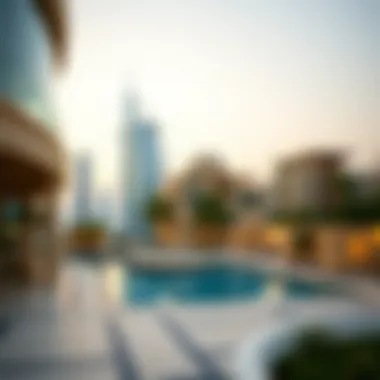
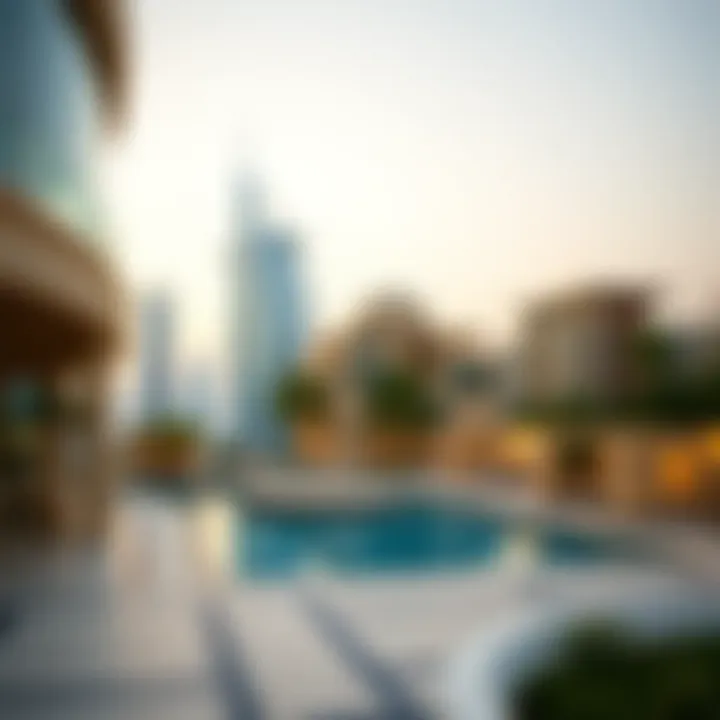
These factors collectively shape the landscape of Dubai's real estate market, guiding both seasoned investors and newcomers on their journey to successful property ownership. Understanding them is key to navigating this dynamic environment.
Prominent Real Estate Cities in Dubai
The real estate landscape in Dubai isn't just about buildings; it's about the communities that thrive within them. Each prominent area boasts its own unique personality, weaving together luxury living with modern conveniences. Investors and homebuyers alike appreciate the distinct characteristics of these neighborhoods, making them essential to any discussion on Dubai's property market. The vibrancy, architectural innovation, and lifestyle offerings set these cities apart, ensuring that they cater to a diverse array of preferences and needs.
Dubai Marina and Its Luxury Offerings
Dubai Marina is a glowing testament to urban elegance. With towering skyscrapers lining the waterfront, this area exudes sophistication at every turn. Here, the luxury lifestyle is exemplified through high-end apartments that often come with stunning views of the Arabian Gulf.
Living in Dubai Marina means being close to a plethora of amenities. Vibrant walkways, upscale dining, and chic boutiques punctuate the landscape. Residents can take a leisurely stroll along the marina or hop on a yacht for a sunset cruise. Furthermore, this area attracts both expatriates and locals, creating a blend of cultures that enriches the community. Investors find the potential for high rental yields enticing, as the demand for luxury properties continues to rise.
Downtown Dubai: A Hub of Elegance
Without a doubt, Downtown Dubai stands as the crown jewel of the city. Home to the iconic Burj Khalifa, the world’s tallest building, this neighborhood encapsulates opulence and grandeur. Visitors and residents are treated to luxurious shopping at The Dubai Mall, which features countless retail options and gourmet dining experiences.
The real draw, however, lies in the lifestyle encompassed within this district. Individuals gravitate towards Downtown for its cultural vibrancy, from art galleries to theaters showcasing world-class performances. Real estate in this area commands a premium, reflecting its status as a sought-after location, both for personal residence and investment opportunities. Additionally, well-planned transport links enhance accessibility, making it an attractive choice for professionals working in the broader Dubai area.
Arabian Ranches: Family-Centric Communities
Arabian Ranches offers a refreshing take on suburban living. Striking a balance between tranquility and convenience, this community draws families seeking a peaceful environment without straying too far from city amenities. The development features an array of villas, each designed with attention to detail and comfort.
Families here benefit from access to communal facilities such as parks, schools, and recreational spaces, fostering a sense of community. The neighborhood prides itself on its family-oriented lifestyle, hosting events throughout the year to engage residents of all ages. For homebuyers, investing in Arabian Ranches offers the allure of a serene lifestyle while still being within reach of the bustling city life of Dubai.
Palm Jumeirah: A Symbol of Opulence
The Palm Jumeirah needs little introduction; it’s an iconic symbol of luxury and innovation. This man-made archipelago resembles a palm tree from above, showcasing some of the most prestigious properties in Dubai. Residents are not only treated to breathtaking waterfront views but also enjoy exclusive access to beaches and private resorts.
In terms of real estate, Palm Jumeirah features lavish villas and apartments that cater to the elite, ensuring premium comfort for its residents. High-end amenities and proximity to fine dining establishments and entertainment options make it a hotspot for investors looking for properties with significant value appreciation potential. Whether it's lounging on the beach or visiting luxurious hotels, life on the Palm is one of unparalleled indulgence.
Jumeirah Village Circle: Emerging Popularity
Jumeirah Village Circle (JVC) is a rising star in Dubai’s real estate market. This community provides a mix of villas and apartments at more accessible price points compared to other luxury districts. JVC’s charm lies in its well-planned layout that encourages community interaction and offers a variety of amenities, including supermarkets, parks, and schools.
Among investors, Jumeirah Village Circle is gaining traction for its potential for high rental returns. The ongoing development of the area adds to its allure, drawing in a younger demographic and expatriates eager for a vibrant community atmosphere. As infrastructure continues to improve, both the neighborhood's popularity and property values are expected to rise, making it a wise consideration for those looking to venture into Dubai's real estate market.
Types of Properties Available
Understanding the types of properties available in Dubai is paramount for anyone looking to invest or settle in this dynamic city. The real estate landscape in Dubai offers a diverse range of options tailored to different lifestyles and budgets. From sprawling villas that exude opulence to modern, chic apartments in bustling neighborhoods, potential buyers can find properties that suit their needs. Each type of property comes with its own set of unique benefits and considerations, which can significantly impact one’s living experience and investment potential.
Villas: Customization and Luxury
Villas in Dubai are the epitome of luxe living. These spacious homes often come with customizable features, allowing buyers to tailor their spaces according to their preferences. It's not just about having a roof over one’s head; it’s creating a sanctuary. Many villas are found in gated communities that offer additional security and amenities such as private pools and expansive gardens, which are ideal for families.
Moreover, the architectural designs of Dubai's villas vary widely, from modern minimalist aesthetics to grand Mediterranean styles. This variety ensures that there is something for everyone, whether someone seeks a contemporary home or something more traditional. When investing in a villa, however, it is crucial to consider maintenance costs and the implications of living in larger spaces, especially in terms of upkeep and associated expenses.
Apartments: Modern Living Spaces
Apartments in Dubai present a more urban lifestyle and cater to a wide-ranging demographic, from young professionals to small families. These properties are situated in prime locations, such as Downtown Dubai or Dubai Marina, offering easy access to work, leisure, and entertainment.
The primary appeal of apartments lies in their modern conveniences and often luxurious amenities. Many come equipped with fitness centers, swimming pools, and communal spaces that promote a vibrant community atmosphere. Living in an apartment provides a lifestyle marked by comfort and connectivity, making it especially appealing to expatriates who want to be at the heartbeat of the city. However, buyers should also take into account factors such as homeowner’s association fees, which can add to overall living expenses.
Townhouses: A Blend of Comfort and Community
Townhouses in Dubai act as a bridge between the spacious villas and compact apartments. They offer multi-story designs that typically include three to four bedrooms, creating ample space for families while maintaining a sense of community. Townhouse developments are often designed to foster neighborly connections through shared aesthetics and communal areas.
One can find townhouses in various communities that focus on family-friendly amenities and landscapes. These buildings often sit in quieter neighborhoods, making them appealing to those who prefer a suburban feel without straying too far from the city’s vibrancy.
When considering a townhouse, potential buyers should keep in mind aspects such as property management and community rules, which can influence both privacy and interaction with neighbors.
"Investing in a property in Dubai is not just about buying a building; it's about embracing a lifestyle that resonates with comfort, luxury, and community."
Market Trends and Insights
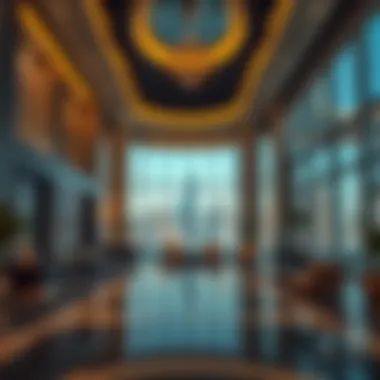
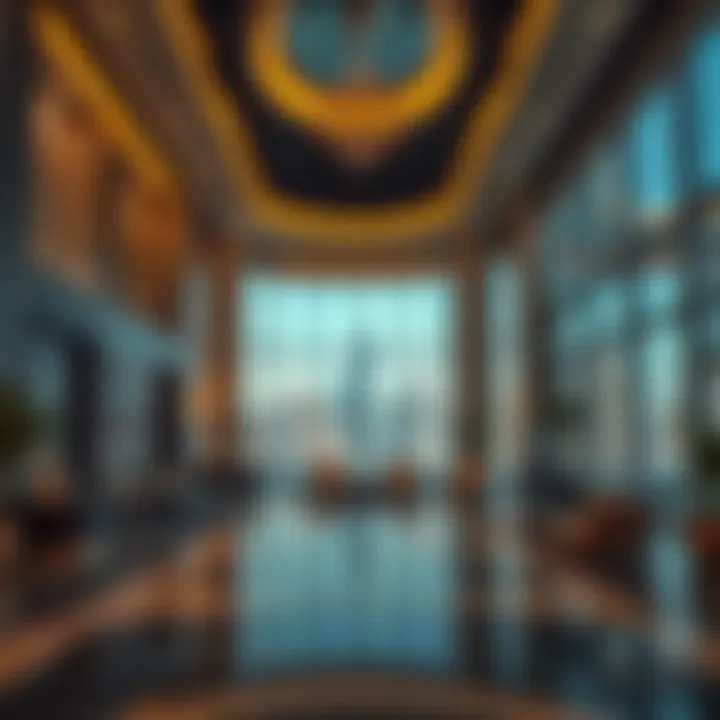
The realm of Dubai's luxury real estate market is not just a playground for the affluent; it’s a dynamic landscape characterized by shifting tides and evolving preferences. Understanding market trends and insights is crucial for anyone looking to delve into real estate in this vibrant city. It enables potential buyers, investors, and property developers to navigate through opportunities while sidestepping pitfalls that this unique market can present. By examining current conditions and investment prospects, stakeholders can make informed decisions that align with their goals.
Current Market Conditions
As of late 2023, Dubai's real estate sector stands on resilient ground. One can witness a resurgence in demand, primarily fueled by a growing population and continued interest from expatriates. Several factors contribute to the current buoyant market conditions:
- High Return on Investment (ROI): Properties in Dubai, especially in sought-after areas like Downtown and the Marina, often yield impressive rental returns, making them attractive to investors.
- Government Initiatives: Recent government measures aimed at enhancing foreign investment make the market more accessible. Initiatives, like the long-term visa system, bolster confidence among international buyers.
- Sustainability Trends: Many new developments focus on sustainability and energy efficiency, echoing global trends. Projects emphasizing green living are increasingly appealing to environmentally-conscious buyers.
Moreover, real estate prices have stabilized, with reports indicating a steady increase in property values, particularly in luxury segments. This stability is often seen as a promising sign, indicating that the market is not subject to the same drastic fluctuations that characterized it in the past.
"Stability in property prices over recent months suggests a maturing market, ready to cater to a discerning clientele seeking long-term investment."
Investment Opportunities
For those looking to invest in Dubai’s luxurious expanse, understanding where to place one’s bets can yield fruitful results. Here are some contemporary investment opportunities worth considering:
- Off-Plan Developments: Many investors find success with off-plan properties, which allow for purchasing at a lower price point before completion. Developments like those in the Dubai Hills Estate showcase stunning designs and promise high appreciation upon completion.
- Luxury Plots: With the demand for premium locations ever climbing, buying plots for bespoke villas in areas such as Palm Jumeirah presents unique opportunities for profitability. Investors can customize according to rising trends in luxury living.
- Short-Term Rentals: With the thriving tourism sector, properties that cater to short-term rentals, particularly in prime locations, can deliver high yields. Platforms like Airbnb enable property owners to capitalize on Dubai's constant influx of tourists.
These opportunities sit at the crossroads of market demand and innovation, making them appealing to those considering a slice of Dubai's oyster.
Ending
Navigating the complexities of Dubai's real estate market is akin to walking a tightrope; however, with the right insights and awareness of market trends, one can maintain balance. Understanding current conditions and actively exploring investment opportunities will equip buyers and investors with the necessary tools to make sound decisions. This ever-evolving market is a treasure trove waiting to be mined, provided one approaches it with due diligence and strategic foresight.
Neighborhood Insights and Amenities
Understanding the neighborhood insights and amenities is crucial when navigating the intricate landscape of Dubai's luxury real estate market. Buyers and investors often look beyond the property itself, seeking areas that not only provide lavish homes but also a vibrant lifestyle. Factors like proximity to essential services, quality of education, and recreational offerings significantly influence property value and desirability.
Educational Institutions
A pivotal aspect of any neighborhood is the availability of educational institutions. In Dubai, some of the most prestigious schools and universities set the stage for a well-rounded community. Institutions like British School Al Khaleej International and Dubai American Academy cater to expatriates and locals alike, offering world-class education and curriculums that prepare students for global opportunities. Areas like Jumeirah and Al Safa are known for their numerous high-ranking school options. This focus on quality education attracts families seeking long-term residency, thus impacting property demand and prices positively.
Healthcare Facilities
Healthcare amenities are paramount for any neighborhood, especially in a city like Dubai where quality health services reflect a community's standard of living. Locations like Dubai Marina and Downtown Dubai feature state-of-the-art medical facilities, including Dubai Healthcare City, which hosts renowned hospitals and clinics. Accessibility to healthcare facilities is a major selling point for potential homeowners. Close proximity to services such as Mediclinic City Hospital and American Hospital Dubai assures residents they can access necessary medical care without hassle. This factor further adds to the appeal of luxury properties in these areas, leading buyers to consider the availability of healthcare while making investment decisions.
Recreation and Leisure Activities
Living in Dubai is not just about luxurious homes; it’s also about the lifestyle that comes with them. Neighborhoods that offer vibrant recreational facilities significantly enhance their attractiveness. From the white-sand beaches of Kite Beach to the picturesque walking trails in Al Barsha Pond Park, residents have myriad options to indulge in outdoor activities. Additionally, upscale experiences like shopping at The Dubai Mall or dining at Michelin-star restaurants create an exhilarating social atmosphere.
"Neighborhood amenities greatly impact property desirability and value, not just today but also for the future."
Investors and homebuyers should also consider cultural and leisure activities, which play a vital role in enhancing quality of life. Events, art galleries, and family-friendly parks enrich the community experience, making them essential features to evaluate when choosing a neighborhood.
Legal Framework for Property Ownership
The legal framework governing property ownership in Dubai is paramount for anyone looking to invest in the real estate market. Understanding this framework is crucial to avoid potential pitfalls and ensure a smooth purchasing process. The rules and regulations surrounding property ownership not only protect buyers and investors but also contribute to the market's overall stability and appeal.
By grasping the intricacies of property ownership laws, potential homebuyers and investors can make informed decisions based on well-defined legal parameters. This knowledge is especially relevant for expatriates, who may face distinct regulations compared to local investors.
Understanding Freehold and Leasehold Ownership
When it comes to owning property in Dubai, you generally have two options: freehold and leasehold.
- Freehold Ownership: This empowers individuals to own property outright. This means owning both the land and the structure on it. It's like having your own piece of the city to do as you please, within the law, of course. Freehold ownership is generally available to foreigners, a distinct feature that sets Dubai apart from many other countries in the region. This arrangement provides more security, as property values tend to rise over time, and owners can benefit from total control over their assets.
- Leasehold Ownership: This is a different ball game. In a leasehold arrangement, investors hold the rights to a property for a specific period, often up to 99 years, which can be renewed. However, unlike freehold, the land remains under the ownership of the original developer or landowner, which poses limitations. Buyers must be cautious and ensure they understand the terms of the lease, as there can be various stipulations on alterations or transfers.
Some might find the leasehold route appealing due to generally lower entry prices, as it may offer more affordable options than full ownership. Nevertheless, the trade-off in long-term stability and value can become a sticking point.
Regulatory Bodies and Compliance
Navigating the maze of property laws in Dubai necessitates familiarity with several regulatory bodies. Understanding how they function and what compliance entails ensures that buyers are not unwittingly stepping into murky waters.
The main players in this domain include:
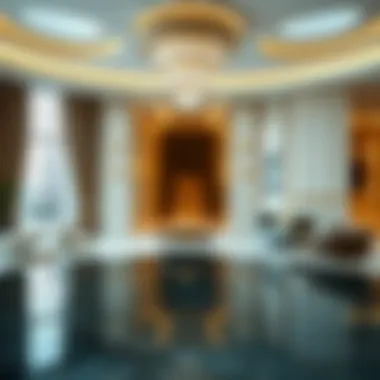
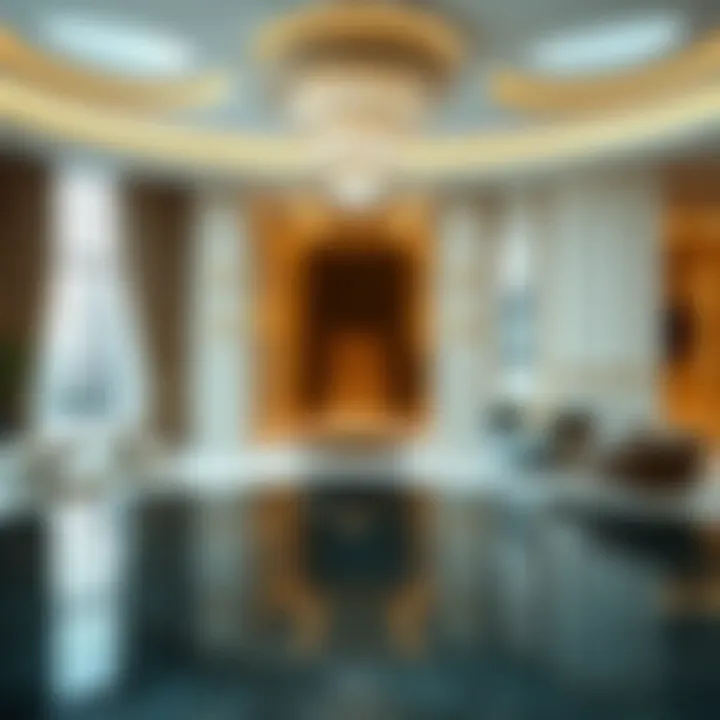
- Dubai Land Department: This is the cornerstone of property transactions in Dubai, responsible for registering properties, granting ownership certificates, and maintaining a record of all real estate activities in the emirate. Homebuyers should always engage the DLD for property registration to guarantee their ownership is recognized legally.
- Real Estate Regulatory Agency (RERA): As a subdivision of the DLD, RERA oversees developers and agents, ensuring they adhere to established laws and standards. They provide valuable guidance through various regulations—from building codes to contractual obligations. Individuals interested in purchasing property should always verify that the project and the developer are RERA-registered.
- Dubai Investment Development Agency: Though more focused on foreign investments, this body aids those looking to establish a business or invest in the broader commercial real estate market.
In type of the compliance aspect, it is essential for buyers to be aware of:
- The need for a trade license if investing in commercial properties.
- Mandatory property insurance to cover likely damages or losses.
- Tax obligations, which currently are relatively low compared to many global markets.
"Understanding the legal landscape is not just beneficial; it's essential for a smooth real estate transaction in Dubai."
Engaging with these bodies and ensuring compliance is fundamental for a risk-free transaction. Overall, understanding these distinct layers of ownership can help individuals navigate the real estate waters in Dubai.
For further details on property ownership laws, you may refer to Dubai Land Department and RERA. Understanding these laws will empower potential buyers and investors, leading to smarter real estate decisions.
Tips for Buyers and Investors
Navigating Dubai's luxury real estate market can be quite the adventure, given its unique characteristics and complexities. For potential buyers and investors, understanding the nuances of the market is crucial. Armed with the right knowledge and strategies, one can make informed decisions that align with their financial goals and lifestyle choices. Here are some detailed insights into what to consider when venturing into this vibrant market.
Conducting Thorough Market Research
Before jumping into any significant investment, market research is a non-negotiable first step. It’s like doing your homework before an exam—neglecting it might leave you in a tight spot later on. Here are key areas to focus on:
- Understanding Market Dynamics: Familiarize yourself with current property trends, demand, and supply metrics. Websites like Property Finder and Bayut can provide invaluable insights.
- Identify Your Goals: Are you looking for a residence, an investment property, or something to lease out? Your objectives will shape your research significantly.
- Local Regulations and Laws: Keep an eye on property regulations or any changes in ownership laws—factor like freehold versus leasehold ownership can impact your choices dramatically.
- Neighborhood Analysis: Each area in Dubai has its flavor—check reviews or forums such as Reddit for experiences from current residents.
"A well-informed buyer is a successful buyer. Every property purchase carries risks, so being prepared can save a lot of headache."
Working with Real Estate Professionals
In the fast-paced environment of Dubai's luxury market, enlisting the help of seasoned real estate professionals can be a game changer. Here’s why:
- Expertise and Insight: Experienced realtors understand the market landscape far better than most newcomers. They will know the ins and outs, right from valuation to investment potential.
- Negotiation Skills: Skilled agents can substantially influence purchase prices. Their negotiation tactics can often reduce costs that a novice might overlook.
- Access to Exclusive Listings: Many of the best properties may never hit the general market. Agents often have insider knowledge and access to off-market listings, giving you an edge in finding the perfect property.
- Streamlined Processes: Dealing with paperwork and legalities can be daunting. A qualified professional will assist in navigating these processes smoothly, ensuring compliance and saving you from potential pitfalls.
In summary, conducting thorough market research and collaborating with real estate professionals are fundamental elements for any buyer or investor. They not only build the groundwork for a successful property acquisition but also enhance your overall understanding and experience of Dubai's luxury real estate market. By being diligent and seeking expert guidance, you can position yourself for success in this thriving ecosystem.
Future Outlook for Dubai Real Estate
The future of Dubai's real estate market is a topic of ever-increasing interest, not just for local investors but on a global scale as well. Dubai is often seen as a shining beacon of luxury and growth in the real estate sector. As such, understanding its future trajectory is crucial for various stakeholders, including real estate agents, investors, expatriates, homebuyers, and property developers. A strong grasp of the predicted trends and the underlying stability of the market will empower investors and help them navigate the complexities of this dynamic environment.
The real estate industry is heavily influenced by external factors such as global economic conditions, changes in regulations, and shifts in buyer preferences. Thus, keeping an eye on these elements can provide insight into what the future holds. More importantly, the Dubai government is known for its strategic long-term planning which can provide a safety net for investors looking to minimize risk in their real estate investments.
Predicted Trends and Market Stability
When examining the future of Dubai's luxury real estate market, several trends begin to surface. Firstly, there's a noticeable shift towards sustainability and eco-friendly developments. Buyers today are more conscious of their environmental impact, which presents an opportunity for developers to explore innovative designs while adhering to green building standards.
Additionally, the increasing popularity of smart homes is shaping the market. Properties integrated with the latest technologies—from automated systems to energy-efficient appliances—are capturing buyers' attention. As urbanization continues to swell in Dubai, investments in technology not only enhance the living experience but also potentially increase property value over time.
It's also worth noting the stability that the Dubai government brings to the real estate sector. With ongoing developments such as Expo 2020 and other mega projects, a sense of market confidence is cultivated. Investors are likely to see this as a favorable environment, suggesting the real estate sector may be more resilient in the face of global economic shifts than one might initially think.
"A strategic partnership between government initiatives and private investments is key in establishing a balanced and sustainable real estate market."
Lastly, demographic shifts are likely to influence the market's future. The influx of expatriates who are often drawn to Dubai's thriving lifestyle and robust job market contributes to a growing demand for housing—both luxury and affordable. Expats, in particular, are becoming an integral part of the property-buying landscape, steering trends and market choices.
Role of Expatriates in Market Growth
The expatriate community plays a pivotal role in the growth of Dubai's real estate market. With people from all corners of the globe converging in this vibrant city, the diverse mix of cultures creates unique demands and expectations in the real estate sector.
Expatriates are often looking for properties that cater to their lifestyle needs—be it proximity to workplaces, schools, or recreational facilities. Their preferences can shape the type of offerings that developers focus on. Therefore, adapting to these demands can also drive market growth, as developers have the opportunity to cater to this significant audience.
Furthermore, expatriates often have considerable purchasing power, which means that when they decide to invest in property, they can have a major impact on market dynamics. This influx of capital tends to stabilize property prices and can encourage further luxury development, particularly in cities like Dubai where international investors are keen to engage.
Closure
The luxury real estate market in Dubai is a multifaceted arena, intricate with opportunities and challenges. Understanding the nuances of this market is not just an academic pursuit; it serves practical purposes for various stakeholders, particularly real estate agents, investors, expatriates, homebuyers, and property developers. Through a deep dive into the Dubai real estate landscape, we can recognize how crucial each component of the market contributes to the greater whole.
Summarizing Key Takeaways
As we wrap up our exploration, here’s what stands out when considering the Dubai luxury market:
- Diverse Neighborhoods: Each district in Dubai offers unique characteristics that cater to different lifestyles and investment strategies.
- Property Types: The market is rich with options ranging from high-end villas and townhouses to luxury apartments, giving buyers ample choice depending on preference and budget.
- Market Trends: Keeping an eye on current developments and projected growth can guide investment choices. For instance, the influx of expatriates plays a significant role in sustaining market vibrancy.
- Legal Landscape: Knowledge of ownership types, such as freehold and leasehold, is essential for anyone looking to navigate the purchase process.
- Practical Tips: Conducting thorough market research and engaging with knowledgeable real estate professionals can be game changers for prospective buyers.
By synthesizing these elements, investors and buyers can arm themselves with the wisdom to make informed decisions in a dynamic environment. Expanding comprehension of the market not only builds confidence but also enhances the likelihood of financial success in one of the world’s most opulent cities. Acquisition of property in Dubai is not merely transactional; it is a commitment to a lifestyle intertwined with economic potential.







